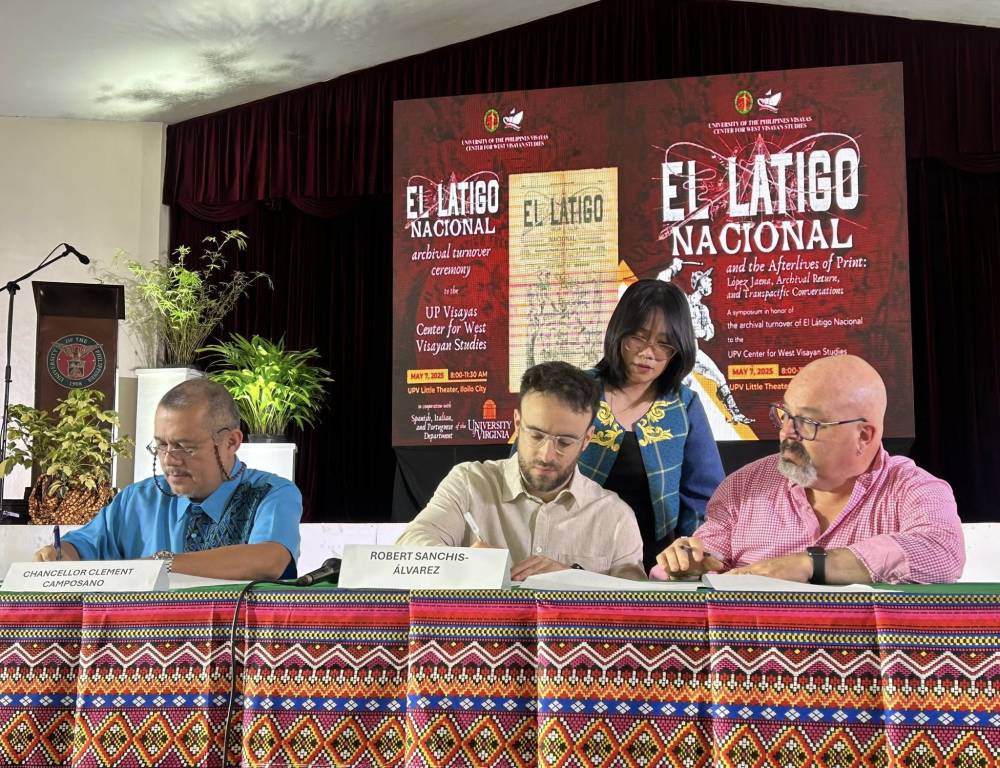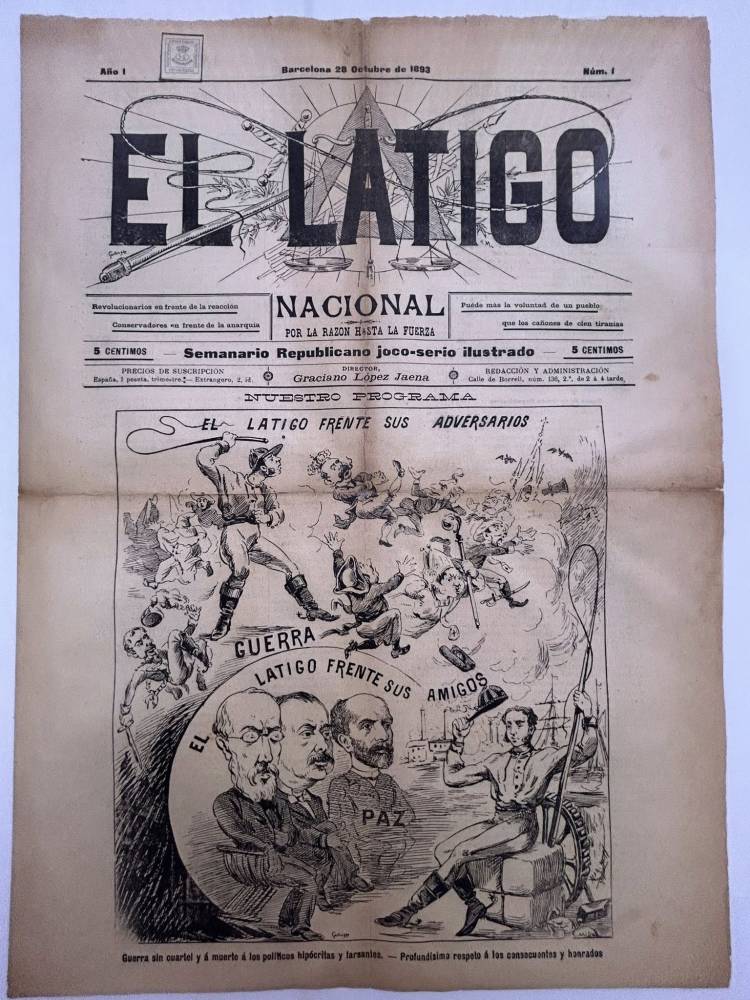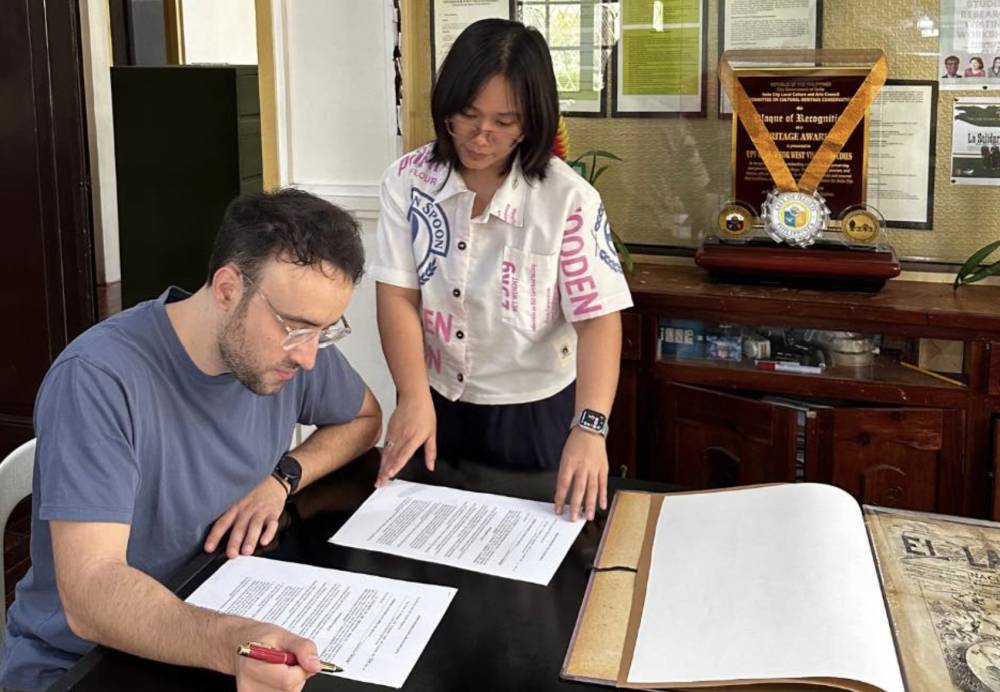Rare copy of Lopez Jaena’s El Latigo Nacional donated to PH

The University of the Philippines Visayas (UPV) in Iloilo City recently unveiled to the public a copy of the late 19th-century newspaper El Latigo Nacional founded by journalist-reformist Graciano Lopez Jaena in Barcelona, Spain in 1893.
The copy, which is temporarily housed at the Center for West Visayan Studies of UPV, was donated to the institution by scholar Robert Sanchis-Álvarez of the University of Virginia (UVA). It will eventually be transferred to the UPV Office of Initiatives in Culture and the Arts–Museum of Art and Cultural Heritage.
Sanchis-Álvarez discovered the copy at a flea market in his native Barcelona two years ago while conducting research.
Prior to its public unveiling, the copy was digitized by the University of Barcelona conservation team and stabilized by the Ateneo de Manila University special collections unit.
Sanchis-Álvarez said it was a long collaborative effort that also involved other institutions such as the UPV.
Following its unveiling, the “El Latigo National and Afterlives of Print: Lopez Jaena, Archival Return, and Transpacific Conservation” symposium was held at the museum. It was organized by the West Visayas Studies with the University of Virginia.
In the seminar, UPV chancellor Clement Camposano talked about Lopez Jaena and his nationalist narrative, as well as his many works on the hero. Ricardo Padron of the UVA presented a lecture on transpacific studies while Sanchis-Álvarez dealt on the material history and the contents on the newspaper.
Attended by members of the Dr. Graciano Lopez Jaena foundation, personnel from UPV and its West Visayas Studies arm, and the public, the seminar also featured Ateneo’s Francis Navarro’s talk on the “importance of recovering voices in the archives.”

Significant find
In a statement, National Museum of the Philippines-Iloilo said that the “turnover of this archival document is very important since it brings with it the memories not only of Iloilo and of the Ilonggo propagandist, but more so the memories and records of the Filipino’s movement for freedom from Spain.”
In an interview with Lifestyle, Sanchis-Álvarez said that “what happened in Iloilo is something meaningful in terms of trying to disentangle historical memory and colonial legacies of Spain and the Philippines.”
He said the donated copy is the first issue of the newspaper which has four pages and contains views on democratic reforms in Spain, touching on republicanism and anticlericalism, and denouncing “institutional corruption and colonial hypocrisy.”
“The paper was published at a moment of intense political ferment: the 1893 Spanish general elections and the implementation of the Maura Law in the Philippines,” he said.
In essence, the law provided autonomy to local governments in the country.
Sanchis-Álvarez further explained that the newspaper “situates itself within a broader republican and secular tradition, invoking Spanish republican propagandist figures such as Emilio Junoy, Joan Sol y Ortega, Salas y Antón, and Odón de Buen.”

Resistance
These individuals, he said, were important leaders in Spanish journalism during the 1890s as well as republican propagandists who supported the calls for reform in the Philippines.
Sanchis-Álvarez said that the donated copy is one of two extant in the world. The other copy, issue four, is stored at the Archivo Historico de la Ciudad de Barcelona. This second extant issue has eight pages with the political tone different from the first one.
According to him, there were at least 10 issues published from 1893 to 1894. The two extant copies have opinion pieces written by Lopez Jaena himself, who also served as the newspaper’s director, equivalent to today’s editor in chief or executive editor.
The first issue, he said, has “so many voices” with a mix of narratives, sarcasm, ambivalence, opinion, mimicry, and a memorial page to Ramon Chies, an anticlerical and republican proponent in Spain.
In a sense, said Sanchis-Álvarez, the newspaper was “an act of resistance” and that Lopez Jaena was directly involved in the republicanism movement in Spain and democratic reforms in both the former and its colony.
A facsimile edition and comprehensive translation are currently in the works, said Sanchis-Álvarez, who added that the digital copy and the translation of the newspaper, which “opens a window into a shared, though asymmetrical, history” of both countries, will eventually be distributed to different schools, museums, and libraries.

















